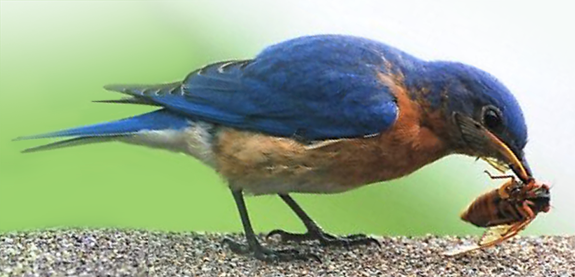While cicada activity is peaking, activity at our feeders is slowing down. Birds are making the most of this once-in-a-lifetime (for them) event. Who could blame them? Brood X is delivering themselves to the birds’ doorstep—as efficiently as Dominos delivers pizza to ours. Imagine free pizza appearing in a mind-boggling quantity that affects storm-tracking radar! See it here.
Why This is a Good Thing
Although we miss seeing the birds at our feeders, there’s a huge benefit to this abundance of natural food: Early broods should be more successfully fledged, increasing the number of surviving offspring.
Chickadees, Cardinals, Bluebirds, Robins and Wrens—especially their babies!— say “Please don’t use pesticides or herbicides in your yard!” Montgomery County agrees and has passed a county-wide Pesticide Law. Read the details on the MoCo government website here.
Meanwhile, Keep Up the Good Work!
Keep monitoring feeders with the same diligence as you would normally, even through this slowdown. Remember, mold can happen pretty quickly! Especially with the heat and humidity right now.
Don’t wait for your feeders or seed to get noticeably (and dangerously!) icky before doing a little maintenance. We have some resources to help!
How and When to Clean Your Feeders
- How to Clean a Bird Feeder. This resource includes:
- When to clean your feeders
- What you will need to clean your feeders
- How to clean feeders, step-by-step
- Why, when and how to give feeders a ‘deep’ cleaning
- Mold Alert! Check Your Feeders
- Why Clean Feeders and Quality Food Matter
Right Now, Bird Baths are Where It’s At
This blast of summer heat makes your bird baths even more appealing! Yes, we’ve repeated this more than a few times, but still can’t say it too often:
All birds need water for drinking and bathing. A bird bath is an opportunity to attract birds that are not tempted by your feeders, like, a-hem, insect-eaters… Here are our best bird bath tips: Wild Birds, Summer and Water.
Juniors are beginning to explore bird baths for the first time. This is one of the highlights (and rewards!) of maintaining a bird bath. Don’t miss out on the fun!
Happy Birding!
Debi & Mike Klein and The Backyard Naturalist Team
Citizen Science
Have you seen your backyard birds eating cicadas? Make a report!
University of Maryland is documenting which bird species are foraging on Brood X for a publication in Maryland Birdlife. If you have observed your backyard birds eating cicadas, they want to know about it. Participate by reporting here.






